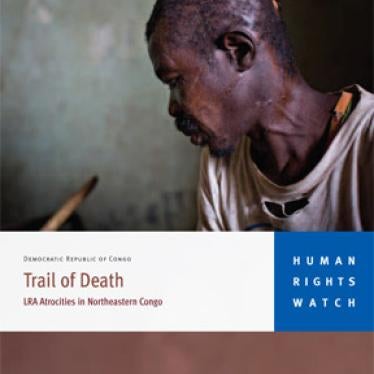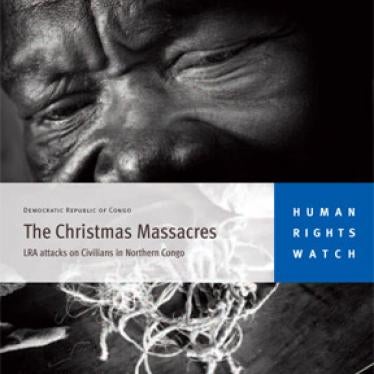From October 20 to 23, Human Rights Watch and the Justice and Peace Commission of the Catholic Diocese of Dungu (CDJP) hosted a four-day workshop in Dungu, northern Democratic Republic of Congo, to consider the continued threat to civilians by the Ugandan rebel group, the Lord’s Resistance Army (LRA). The workshop was attended by civil society activists from the Central African Republic (CAR), South Sudan, Congo, and Uganda, as well as other international actors.
This declaration and the recommendations listed below were commonly developed and agreed to by all participants.
The participants welcomed the recent announcement by the government of the United States to deploy 100 military advisors to LRA-affected areas, and particularly recognized the commitment the US government has shown towards helping to resolve the LRA problem. Participants stressed, however, that this deployment will only be effective if the governments of CAR, South Sudan and Congo recognize the continued LRA threat to civilians across the region and fully commit to meaningful cooperation in regional and international efforts to protect civilians.
The participants raised concerns that the governments of Congo, South Sudan and CAR, have repeatedly minimized the LRA threat and its devastating effect on civilians. The participants raised particular concerns about the Congolese government who have stated that the LRA threat no longer exists in Congo, a claim the participants strongly disputed.
Participants also called for more significant engagement from the African Union, the European Union, the United Nations Security Council and UN peacekeeping missions in the LRA-affected region. They further called for more financial and technical support to early warning networks, sensitization and demobilization efforts, and long-term rehabilitation for returnees and ex-combatants.
Background
The LRA has wreaked havoc against civilians for over two decades, from its start in northern Uganda to its current presence in northern Congo, South Sudan, and eastern CAR. Since late 2008, the LRA has been responsible for thousands of deaths and abductions, many of them children, and the displacement of over 400,000 people from their homes. National armies in the LRA-affected region, as well as UN peacekeepers, have repeatedly failed to effectively protect civilians.
Members of civil society working in this region live with the daily insecurity caused by the LRA. Participants at the workshop recognize they have a role to play in improving civilian protection and believe that their involvement in early warning communication systems and assistance to survivors and escapees could make an important contribution to enhanced security.
Civil society actors from the three countries currently affected by the LRA, as well as northern Uganda, participated in the workshop coming from: Haut Uele district (Dungu, Bangadi, Doruma, Duru, Faradje, Ngilima, and Niangara) and Bas Uele district (Ango, Banda, and Poko) in northern Congo; South Sudan (Ezo and Yambio); Central African Republic (Obo and Zemio); Gulu in northern Uganda; and a national Congolese human rights network based in Kinshasa.
Participants discussed the current security and human rights situation in their respective areas as well as individual and collective actions to advocate for better civilian protection measures. Participants were also trained on human rights documentation methods, adapted for environments in which resources and communications are extremely limited.
RECOMMENDATIONS
During the course of the workshop, participants developed and agreed on the following recommendations.
To the governments of CAR, South Sudan, Congo, and Uganda, the African Union, the US government, the EU, the UN Security Council, UN peacekeeping operations in the LRA-affected region, the UN and other international aid agencies
1. Fully Recognize the LRA Threat to Civilians
• Cease any attempts, especially those by the Congolese government, to minimize the scale of the LRA threat and its impact on civilians. Base information on the extent of the threat on facts and improve information gathering and sharing about LRA attacks and movements.
2. Improve Coordination Amongst Regional Governments (CAR, South Sudan and Congo)
• Fully commit to actively and meaningfully cooperating with regional and international efforts to apprehend LRA leaders, enhance civilian protection, encourage defections and provide humanitarian support to survivors and affected communities.
3. Deploy Capable, Responsible, and Disciplined Military Forces to Protect Civilians
• Recognizing the positive impact of the training the United States has provided to one Congolese army battalion operating in the LRA-affected area, the US, France, the United Kingdom, and other concerned actors, should provide training for additional army units, including commanding officers, of national armed forces designated to take part in operations in LRA-affected areas, with a particular focus on improving civilian protection. Consider the future possibility of joint training sessions.
• Deploy only professional soldiers and officers capable of protecting civilians to LRA-affected areas who are adequately supplied, paid and fed; investigate and hold to account any military personnel responsible for diverting resources.
• Ensure strict respect for human rights and military discipline by all armed forces involved in counter-LRA efforts; those forces and individuals implicated in abuses should be immediately investigated and held to account.
• Encourage improved civilian-military relations between national armed forces, including with US military advisors, and local communities. Local leaders, civil society representatives and community law enforcement personnel should be included in regular security meetings and should have opportunities to regularly meet with US military advisors and representatives of other national armed forces, to share information about threats to civilians.
• Ensure US military advisors are mobile and spend time in the interior outside of the larger centers, especially in response to new information about LRA movements and attacks.
• Consider deploying US military advisors to Doruma, in Congo, given its strategic location at the crossroads of Haut Uele, Bas Uele, CAR, and South Sudan and in an area where the LRA has repeatedly attacked civilians.
• Expand MONUSCO deployment to Bas Uele to protect civilians and help facilitate the delivery of humanitarian assistance.
• Urge MONUSCO to participate in rapid reaction deployments, in coordination with US military advisors and national armed forces, to protect civilians and support efforts to apprehend LRA leaders sought on arrest warrants. MONUSCO should dedicate troops and transport resources specifically for this type of rapid reaction deployment.
4. Support Early Warning Communications Networks
• Facilitate improved coordination for reporting on LRA movements and attacks on civilians encountered by national armed forces operating in the region and/or reported by local communities.
• Ensure that communications systems are available in all LRA-affected areas. As a top priority, expand telephone networks throughout the LRA-affected area. In the immediate term, ensure community-run HF radios are available in all key population centers.
• Train and support members of community associations in all key population centers in the LRA-affected areas to promptly report information to a central early warning information collection center. This center should collect information on verified LRA attacks on civilians or national armed forces, LRA movements, escapees, and LRA combatants who have been captured, killed or who have surrendered. This center would centralize information from all three countries of the LRA-affected region and share the information with concerned actors.
• Ensure a rapid reaction force with appropriate transport resources is available to protect civilians and pursue assailants, with the goal of apprehending LRA leaders, when the presence of LRA combatants is reported in an area.
• Ensure that humanitarian assistance is available to affected populations soon after an LRA attack if there are significant levels of displacement or other needs; ensure that humanitarian assistance responds to the priority needs identified by members of the local community.
• Support construction of road infrastructure throughout the LRA-affected region.
5. Support Returnees/Ex-combatants
• Support the establishment of a rehabilitation center in CAR (Obo and/or Zemio) and strengthen the capacity of the centers in South Sudan (Yambio) and Congo (Dungu).
• Support and train local associations in remote areas to conduct long-term follow-up with returnees after they return to their homes, including psychosocial support, family mediation, education support, and economic reinsertion into their communities.
• Privilege civilian rehabilitation programs and methods (rather than sending returnees to military bases).
• Improve coordination to help returnees get home, especially when they escape in a different country from their own.
• Support community funds to rebuild towns or villages attacked by the LRA, such as repairing schools, hospitals and other infrastructure which may have been destroyed.
6. Support Demobilization Efforts
• Expand UN DDRRR efforts to South Sudan and CAR (i.e. with appropriate authorization for MONUSCO’s DDRRR section to operate in South Sudan and CAR).
• Support and expand coverage for community radio stations and FM radio messages aimed at encouraging LRA combatants to defect. These programs should operate independently without the interference of government actors.
• Sensitize national armed forces and local communities to the proper treatment of ex-combatants and returnees when they escape from the LRA. Encourage former LRA combatants and abductees to participate in such programs if they so wish.
Signed by:
1. Association africaine de défense des droits de l’homme (ASADHO), Kinshasa, RDC
2. Association des victimes de la LRA, Obo, RCA
3. Association Zereda, Obo, RCA
4. Commission Diocésaine pour la Justice et la Paix (CDJP), Dungu, Haut Uélé, RDC
5. Commission Diocésaine pour la Justice et la Paix (CDJP), Duru, Haut Uélé, RDC
6. Commission Diocésaine pour la Justice et la Paix (CDJP), Ngilima, Haut Uélé, RDC
7. Commission Paroissiale pour la Justice et la Paix (CPJP), Bangadi, RDC
8. Communauté des Églises Évangéliques en Centrafrique (CEEC), Zemio, RCA
9. ECS Nzara Diocese, Yambio, South Sudan
10. Justice and Peace Commission, Catholic Diocese of Tombura-Yambio, South Sudan
11. Société civile d’Ango (SOCIDA), Bas Uélé, RDC
12. Société civile de Doruma, Haut Uélé, RDC
13. Société civile de Faradje, Haut Uélé, RDC
14. Société civile de la Chefferie Mopoy (SOCICOMO), Banda, Bas Uélé, RDC
15. Société civile de Poko (SOCIPO), Bas Uélé, RDC
16. Solidarité et Assistance Intégrale aux Personnes Démunies (SAIPED), Dungu, RDC
17. Traumatisme blessure du Cœur, Zemio, RCA
18. Union des Jeunes de Doruma pour le Loisirs (UJDL), Doruma, Haut Uélé, RDC
19. Union of Journalists of South Sudan, Yambio, South Sudan
20. Unity Is Strength, Yambio, South Sudan





